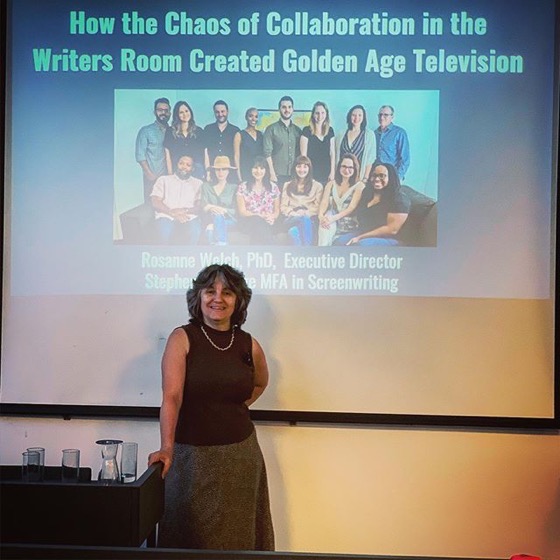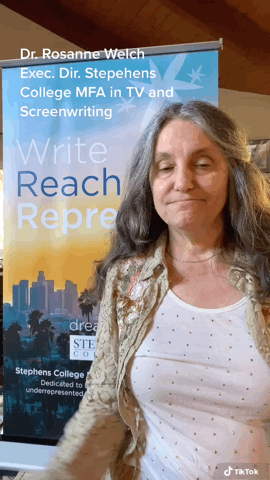
Mention of the name “Dorothy Parker” conjures up thoughts of New York’s famed Algonquin Round Table and the lone woman (though Edna Ferber and Ruth Gordon often stopped by) trading quips with the greatest male writers of her day. Few know that Parker pounced on Hollywood, following in the footsteps of many those male writers looking for a quick – and hefty – payoff. Parker’s second husband Alan Campbell (who knew she was married?) had heard the call of the West but her name in their shared credits cinched those extra 000s on their shared studio checks.
The imbalance of fame in their marriage lead to one of Hollywood’s greatest stories, one that is remade in almost every generation. But Parker lived emotional experience gave the story its birth. If you’ve seen any of the myriad versions of A Star is Born I believe you have seen into Parker’s heart as much as if you’ve read any of her poetry or short stories. All these writings share a voice dripped in sarcastic wit and word play used as brain armor to combat an ever-present tide of melancholia and loneliness.\
Star originally focused on an up and coming actress (Janet Gaynor) who falls in love with a partner whose fame is on the wane. Remade in 1954 for an up and coming musical comedy performer (Judy Garland) it was reconfigured for a rock star (Barbara Streisand) in 1976 and a pop star (Lady Gaga) in 2018. All but the latest version share the tragic concept that society couldn’t condone a woman more successful than her man. Parker’s lived emotional experience encompassed more sadness than her marriage.
Born Dorothy Rothschild in New Jersey in 1893, her mother died when she was five years old. Her father raised her with the help of a stepmother Parker disliked. In her late teens Parker, who was even then witty, wrote what she characterized as ‘light verse’ that didn’t sell – until it did. Parker’s reputation as a writer grew from writing for The New Yorker and then publishing Enough Rope, a collection of poetry, in 1926.
Her first marriage failed after her husband returned from World War I. Her second ended in divorce, remarriage and then Campbell died of a drug over dose. Her career largely never wavered, moving from magazines to screenplays, including Saboteur for which Alfred Hitchcock courted her contributions and counted them as so important he offered her a shared cameo in the film.
You can find comments about how Parker and Campbell worked together in S.J.Perelman’s published letters or in reminiscences of prolific (and also married) screenwriters Frances Goodrich and Albert Hackett who had the office next door. It amounts to the idea that Dottie, as she was called by friends, did the bulk of the writing and character creation and Campbell did not. You’ll hear more about Goodrich next month! Meanwhile, it is hard to decide which cultural icon has become a more enduring and influential touchstone to the twentieth century – A Star is Born or Dorothy Parker.
Read Dorothy Parker: Born to be a Star of Poignant and Pointed Word Play on the Script web site
Read about more women from early Hollywood
![12 Kenny Johnson from How The Chaos Of Collaboration in the Writers Room Created Golden Age Television [Video]](https://rosannewelch.com/wp-content/uploads/2021/05/srn-porto-12.jpg)



![11 Donald Bellisario from How The Chaos Of Collaboration in the Writers Room Created Golden Age Television [Video]](https://rosannewelch.com/wp-content/uploads/2021/05/srn-porto-11.jpg)
![10 Steven Bochco from How The Chaos Of Collaboration in the Writers Room Created Golden Age Television [Video]](https://rosannewelch.com/wp-content/uploads/2021/04/srn-porto-10.png)




![09 More on Stephen J. Cannell from How The Chaos Of Collaboration in the Writers Room Created Golden Age Television [Video]](https://rosannewelch.com/wp-content/uploads/2021/04/srn-porto-09.png)

![08 Stephen J. Cannell and Adam-12 from How The Chaos Of Collaboration in the Writers Room Created Golden Age Television [Video]](https://rosannewelch.com/wp-content/uploads/2021/04/srn-porto-08.png)

![07 The Writer’s Voice from How The Chaos Of Collaboration in the Writers Room Created Golden Age Television [Video]](https://rosannewelch.com/wp-content/uploads/2021/04/srn-porto-07-1.jpg)